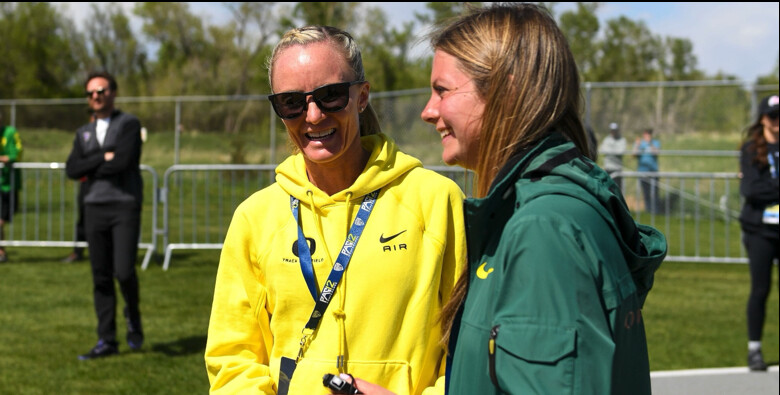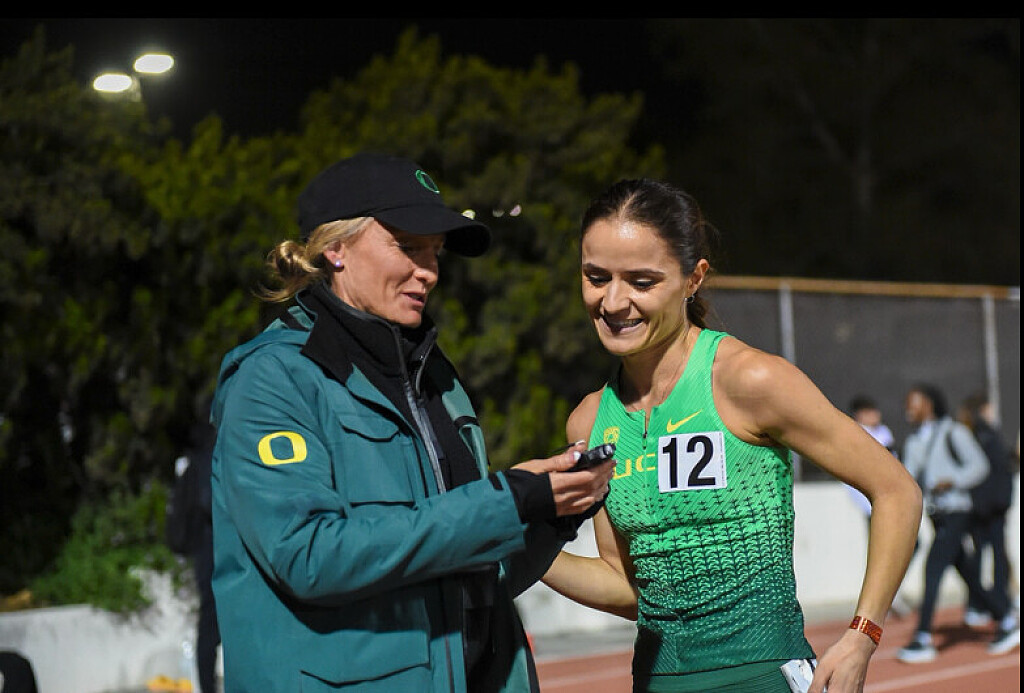Running News Daily
Running News Daily is edited by Bob Anderson. Send your news items to bob@mybestruns.com Advertising opportunities available. Train the Kenyan Way at KATA Kenya and Portugal owned and operated by Bob Anderson. Be sure to catch our movie A Long Run the movie KATA Running Camps and KATA Potato Farms - 31 now open in Kenya! https://kata.ke/
Index to Daily Posts · Sign Up For Updates · Run The World Feed
Shalane Flanagan Finds Her Sweet Spot With College Coaching
She’s juggling the University of Oregon women’s distance runners, the Bowerman Track Club, and a young family.
Before she gives a new workout to her University of Oregon athletes, Shalane Flanagan will try it out herself.

During cross-country season, it was a 5-mile tempo loop. Was it too hilly? Were the turns too sharp? In April, she was “messing around at the track one day,” as she described it, when she attempted a descending ladder of mile-800-600-400 at 10K-5K-3K-1500 pace with a short jog recovery.
“Yeah, that’s really hard,” she thought to herself. “But I think if they did that twice, it would make 10K runners feel really prepared.” Her goal with the experimentation is to make sure a workout is “feasible, but not outlandish” before her runners do it.
Few distance coaches in the NCAA are doing what she does, testing hard workouts, although Flanagan, 42, is quick to say that she does not hit the same splits her athletes do. Her boss, Oregon head coach Jerry Schumacher, is not so sure. “I see her out running every now and then, holy cow, she’s flying,” he told Runner’s World, quipping that it’s too bad she’s used up her NCAA eligibility.
Fewer still have the credentials that Flanagan, a four-time Olympian, has. She was the Olympic silver medalist in the 10,000 meters in 2008 and the 2017 New York City Marathon champion. Since she retired in 2019, she stayed on as an assistant coach with the Bowerman Track Club, a Nike pro group also coached by Schumacher that she ran for in the latter stages of her career.
That experience gives her credibility with her runners. So when she tells her athletes that they’re ready to handle a workout or race a certain time, they believe her.
“I don’t like to refer back to myself a lot,” she said in an interview at her home, a large 1920s colonial about a half mile from Hayward Field. “But I’ll say, ‘Hey, I’ve had experience with this,’ and I think they know, when I’m giving them advice, it’s not a hypothetical. I’m not projecting or guessing.
“They know it’s coming from a genuine place, because I’ve lived it,” she added. “I think that can be helpful with their confidence.”
Multiple full-time jobs
Flanagan had been living near Portland, Oregon, with her husband, Steve Edwards, and toddler son, Jack, when Schumacher was hired as the head coach of Oregon in Eugene, two hours south, in the summer of 2022. He brought Flanagan on as an assistant coach, while both kept their responsibilities with the Bowerman team, which also moved to Eugene. It was a lot.
Those early days for Flanagan—getting to know 11 female distance runners on the team, developing their training, learning the ever-changing NCAA rules, recruiting—were exhausting. And that was before they adopted a second child, Grace, as a newborn, in January 2023. They had only hours notice before Grace’s arrival.
Flanagan gets childcare help for Jack, almost 4, and Grace, 1, from a variety of babysitters and her parents. Her father, Steve Flanagan, and her stepmother visit often. One time, Flanagan had some team members’ parents visiting, and she turned around to see her dad showing them her Olympic medal. “What are you doing?” she asked him. “Put that away, that’s embarrassing.”
About three months in, when Schumacher asked her how she was handling the workload, she told him she was overwhelmed. “I’m really tired,” she said, “but this is the most fun I’ve ever had professionally. Like, I really love this job. I really love college athletics.”
Schumacher gave her full autonomy to write the training for Oregon’s women. And unlike with the Bowerman program, which former runners have said did not have much variation depending on the athlete, Flanagan has personalized training at Oregon for each individual. Some athletes on her team run as little as 25 miles per week, others go as high as 75.
One cornerstone of her training is the weekly long run on Sundays, and most weeks it has some structure to it, with tempo portions or a fartlek. For most of the team, the distance ranges from 12 to 16 miles, depending on the person.
When she first arrived in Eugene, she wrote the training with ranges in mileage. Easy days, for instance, she’d have her runners do 6 to 8 miles, depending on how they felt. They didn’t like that. They wanted an exact number. Getting them to trust themselves, listen to their bodies, and know the difference between muscle soreness and a potential injury has been one of her biggest challenges.
“I have tried to instill in them that they need to learn their body,” she said. “Like, I’m not in their body—they need to take stock and learn how to read their body. It’s one of the greatest skills and assets I felt like I had [as a runner].”
Flanagan tries to run with various groups at least one day per week on their easy runs. “It’s fun to run with the coach,” said Klaudia Kazimierska, who was fourth in the 1500 meters at the NCAA outdoor championships in 2023. “She’s a great inspiration, and she was a great athlete. She tries to give us a lot of information—and she tries to show us that running is so fun.”
Flanagan finds it easier to learn about her athletes when they’re on the run instead of sitting down and looking at one another. She’ll pick up vibes about what’s going on with them and urge them to limit their social media, especially when it comes to training.
“They devour information about what everyone else is doing,” Flanagan said. “I tell them, ‘You’ve got to be careful what goes in your head.’ I don’t follow any other kids from any other programs or any other coaches. I think it would undermine my intuitiveness. I don’t want to know.”
At the same time, she finds her college athletes much more professional than she was as an undergraduate at the University of North Carolina, when she worked hard, but also focused on her classes and other parts of college life. Not these women. “If anything, I’m like, ‘Yo, you’ve got to chill out. You’ve got to dial this back,’” she said. “They’re really into their running and I don’t have to nudge or push. They are really on top of it. It’s kind of freaky.”
Mixed results
Flanagan’s approach has yielded immediate results, but some athletes have had setbacks as well.
Last year, four qualified for the NCAA outdoor championships in the distance events, from 800 to 10,000, including three who made the final in the 1500.
Early in the 2024 outdoor season, the Ducks seemed destined to have more in this year’s championship meet, which started June 5 at Hayward Field.
At the end of March, Maddy Elmore set a school record in the 5,000 meters, running 15:15.79. Two weeks later, Şilan Ayyildiz, a transfer from the University of South Carolina who had been at Oregon for only about three months, ran 15:15.84.
Ayyildiz lines up at the NCAA championships this weekend, along with Kazimierska and Mia Barnett in the 1500 meters, and a freshman steeplechaser, Katie Clute. But Elmore sustained an injury to her soleus in late April and was unable to run in the qualifying meet for NCAAs. Flanagan’s total is again four athletes at NCAAs. She had hoped to have at least one qualifier in every event distance event.
In her short tenure, she has seen how college students have to grapple with stress, classes, finals, and in some cases, anxiety. They pick up illnesses. The big result doesn’t always come at the right time—if it comes at all. “I see these things and I see how they move and handle the work, but sometimes in this season, I may not get the performance in a race,” she said. The coach is still learning.
A busy summer
Elmore might be back in time to race the Olympic Trials, which begin on June 21. Kazimierska will go home to Poland and hope to make the Polish Olympic team in the 1500 meters. As soon as the season is over, Flanagan will turn more of her attention to the Bowerman team, which currently has three women: Karissa Schweizer, Christina Aragon, and Kaylee Mitchell. The club had several departures from the men’s and women’s side after Shelby Houlihan’s doping ban in 2021 and the move to Eugene in 2022.
It’s been difficult for Flanagan to watch the turnover, especially as some of the athletes she’d trained alongside for years, like steeplechaser Courtney Frerichs, left. They’re friends.
At the same time, Flanagan understands it. She changed coaches a few times herself during her career. It would be selfish for her to expect them to stay.
“Especially at the end of a career, to eke out those last big performances, sometimes you need a change of scenery,” she said. “I actually think it’s healthy to get different training, a different stimulus. Sometimes you can fall into this monotony and it feels stale especially if you’ve been doing it for a while.”
When she heard from athletes that they were thinking of leaving Bowerman, Flanagan jumped in with suggestions.
Her coaching brain took over to help.
“At the end of the day, I want them to be successful and happy,” she said. “So when they expressed maybe needing a change, I’m like, ‘Okay, let’s work through this. What are your plans? I don’t want you to leave and aimlessly not have a plan. What does that look like, what do you want to do?’ It’s a natural evolution.”
by Runner’s World
Login to leave a comment




